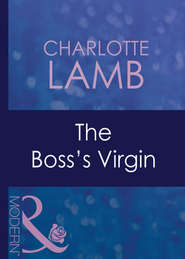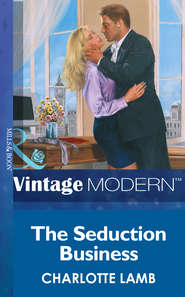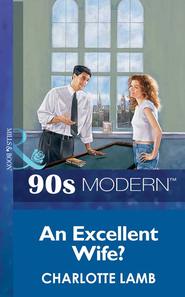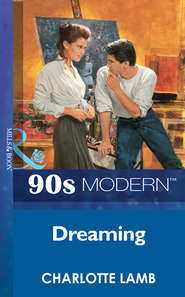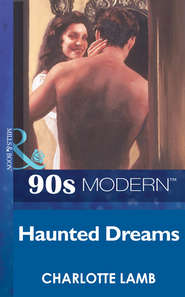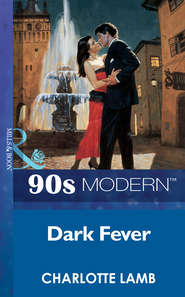По всем вопросам обращайтесь на: info@litportal.ru
(©) 2003-2025.
✖
The Yuletide Child
Автор
Год написания книги
2018
Настройки чтения
Размер шрифта
Высота строк
Поля
It went on day after day, all the same arguments, the same pleas and angry protests, until her wedding day.
Michael’s bitterness and rage made life impossible in the theatre during that month but Dylan rode the storm somehow, her mind entirely set on the moment when she would become Ross’s wife. Michael was right—she was possessed, nothing else mattered to her, she was being carried away by an instinct older than time. She wanted to sleep in Ross’s bed every night, bear his children, spend her life with him. The life force had her in its grip and her career no longer mattered a damn. She found rehearsing tiring; the nightly performances passed in a vague dream. She was no longer part of the company. In her own mind she had already left, although her body went on performing.
She hadn’t believed Michael would come to the wedding, but he did, glowering darkly from his seat in the church. His friends, the company, all the dancers they had been to school with, were on his side, their eyes accusing her of treachery, betrayal. How could she do this to him? they silently asked, those eyes.
Afterwards, at the reception, he walked up to Dylan in her white dress and veil. She stiffened, afraid of what he might do next, but all he did was take her hands and kiss them lingeringly, the backs and then the pale pink palms.
‘I’m not saying goodbye. You’ll be back. You can’t exist away from us. When the madness passes, you’ll come back to me.’
‘Don’t hold your breath, Carossi!’ Ross snapped, tense as a drawn bow beside her, putting his arm around her waist and pulling her close to him.
Michael ignored him as if he was invisible. Dylan watched him walk away, sadness welling up inside her. Ever since they’d first met at ballet school they had been so close, almost one person instead of two; it was hard to say goodbye, harder to think of life without him.
She and Ross left for their honeymoon a few minutes later. They flew to Italy and spent two weeks at a small hotel in the Tuscan hills, making love day and night with a passion that excluded everyone and everything else, although they managed to spend a day at Venice and another at Florence. Dylan remembered both days like waking dreams: she and Ross wandered together, entranced, through the cities, looking at each other, not the beautiful buildings, the River Arno, the Grand Canal, the famous paintings, the statues in the narrow, old streets of both those ancient and exquisite cities. They were merely the background of the happiness Dylan and Ross shared, like painted designs on a stage backcloth.
After their honeymoon Ross took her up north to the house they were going to share, and for the first time she saw his forest, the ranked dark green of the conifers, the scent of pine, the darkness in the heart of the trees. There was no other house in sight. There was very little traffic; few cars ever passed along that narrow road.
Dylan was a city girl, used to the busy streets of London, the noise and fumes, the roofs crowding the skyline, other people everywhere. Even during their honeymoon there had always been crowds circling them. Now they were alone, in a haunted landscape.
This was the first moment she felt a stirring of doubt, a sense of panic. She had married Ross without stopping to think about what she was throwing away, leaving behind; the city she had lived in all her life, the pleasure and pain of dancing, the companionship of the ballet company, the partnership with Michael which had been her life for years.
From her first sight of Ross none of that had seemed to matter any more. She had become a driven creature, only knowing she needed this man more than breath itself. Love had not so much obsessed her as consumed her, taken over her whole life.
Now she was alone with Ross and his forest, facing the consequences of her marriage, looking down into the deep abyss between her past and her future, the life she had led and the life she would lead in future. Standing at the window of their bedroom, looking out, she saw nothing but trees and sky, heard only the wind moving the branches, the sigh and whisper of the forest, and fear prickled under her skin.
What had she done?
CHAPTER TWO
AND then Ross came up behind her, put his arms around her waist and kissed her softly on the side of her neck. Dylan leaned back against him, sighing with pleasure, pushing away her moment of doubt and uncertainty. She loved him more than she had ever loved anything or anyone else before. Whatever she had had to give up weighed very little in the scales against having Ross.
‘Come and meet my trees,’ he whispered.
He always talked about them as if they were human, had feelings, could hear what he said to them and even answered him in their own way. Dylan smiled, touched by that, by his passionate commitment to his work That was what she wanted from him—that deep, unfaltering love. She wanted to give as much back, too.
‘I’m dying to!’ she assured him.
His smile of pleasure made her heart lift. He wanted her to share his feelings about the forest. Dylan wanted to be part of every aspect of his life. Wasn’t that what marriage meant? Sharing everything, becoming one flesh, one heart, one mind?
The unforgettable scent of pine met them as soon as they walked through the gate in their garden hedge into the forest. Ferns brushed their legs, flies and midges buzzed them, powdery-winged brown and blue butterflies hovered over spring flowers in the long grass at the forest rim. Under their feet was the crunch of pine needles. Sunlight laid out needle-fine paths in front of them under the fir trees until they faded into darkness.
As the shadows around them deepened Dylan couldn’t help shivering. ‘It’s quite cold in here, isn’t it?’
She was wearing jeans and a light pink shirt, over which she wore a denim waistcoat but no jacket because the weather was warm for late March, so long as you were out in the sunlight. Once they were deep into the forest, though, the sun didn’t penetrate the closely set trees and her skin had chilled rapidly.
Ross gave her a quick look, then took off his tweed jacket and put it round her shoulders. ‘Better?’
She snuggled into the warmth from his body which the tweed retained along with his own particular body scent. ‘That’s lovely. But I don’t want you to get cold. Maybe we should go back?’
‘Oh, I’m used to working out here in all weathers; I never feel the cold.’ He took her hand. ‘Come on, I want to show you something.’
She had to move quickly to keep up with his long-legged stride. The tall pines stretched all around them now; they were deep into the forest, with very little light to show them where they were going, and Dylan was oddly afraid of the pressing tree trunks, the shadows, the cool, pine-scented air.
All the forests and woods she had ever known had had broadleaf trees, oak and hornbeam, beech and ash, which shed their leaves in autumn and did not grow too close together, so that open glades stretched in places, full of light and giving space for wild flowers and tussocks of long grass. She had never been nervous in those woods, but she was nervous now.
At last Ross stopped moving and put a finger to his lips, whispering to her, ‘Keep very still. Look...there...’ He pointed to a tree a few feet away.
Obediently not moving, Dylan peered, but at first could not see anything interesting. Then there was a shirr of wings, a flash of gold and cream. A tiny bird flew up to a branch of the conifer and perched on a web of ivy. A second later Dylan spotted a basket-shape hanging there; the little bird disappeared into it.
Looking up at Ross, she silently shaped the word ‘nest’.
He nodded. ‘A goldcrest’s nest,’ he whispered, so softly she could only just hear him.
The bird flew out and vanished among the trees, and Ross said very quietly, ‘The nest is made of moss—isn’t it clever, the way it’s made? She must have fledglings. We often get goldcrests here; they feed on insects which live on conifers, breed in the bark—beetles and flies, for instance—not many birds live among fir trees, but it’s a habitat that agrees with goldcrests.’
‘I’ve never seen a goldcrest before,’ she said wonderingly. ‘It’s such a wonderful colour.’
‘No, you wouldn’t have—they aren’t city birds.’
‘I wish I could see the fledglings. Do you know, I’ve never seen a bird’s nest? If I’d had a brother I might have done, but there was just me and Jenny and we never went bird-nesting.’
‘I’m glad to hear it—these days it’s very frowned on. You’re encouraged to use binoculars and watch a nest, never to interfere with it, and certainly never to remove eggs.’
‘Do people still do that?’
‘Unfortunately, yes. Some collectors have no conscience. Luckily, that tree is far too high to climb. Goldcrests aren’t common birds; we have to protect them.’ Glancing at his watch, he said, ‘Look at the time! We’ve been in here nearly an hour. Doesn’t time fly when you’re enjoying yourself? We’d better start walking back.’
Dylan was relieved to see the sunlit edge of the forest reappearing. There was something disturbing about the deep interior of the forest; it was so silent and full of shadows, making the skin on the back of her neck creep. She couldn’t say why, except that, perhaps, she knew so little about the natural world. She had lived in a great city all her life. She had a lot to learn.
Just before they left the forest something red flashed up a tree, making her jump and stand still, staring upward.
‘What was that?’
‘A red squirrel,’ Ross said casually.
Her eyes widened. ‘Red? I’ve never seen a red one; in London we only have grey squirrels.’ She stood staring up the tree; the squirrel peered down at her, its bushy tail flicking to and fro. ‘Will it come if I feed it some nuts? There were squirrels in the park near where I lived which came right up to you and took nuts from your hand.’
‘They were semi-tame—this is a wild squirrel,’ Ross told her. ‘It might run down and snatch nuts if you threw them and stayed back, but it wouldn’t eat out of your hand.’
As they finally left the forest, coming out into the sunlight, she asked him, ‘Have you got any books I could read? On the forest?’
‘I’ll find one for you,’ Ross promised. ‘And this evening, after supper, we’ll take another walk. I’ll show you the moths; they are really something! The forest is very different at night.’
Dylan hoped he didn’t notice the atavistic shudder running through her at the idea of going into the forest in the dark. Smiling bravely, she said, ‘Wonderful, I’ll look forward to that.’ Somehow she had to learn to love the forest for his sake.
They never got very far among the trees that night, though. Before they had gone more than a few steps Dylan felt something scuttle across her face and screamed, frantically brushing her skin to get rid of whatever it was.
Ross had a torch in one hand; he switched it on and turned it on her, blinding her. ‘Stand still. Oh, it’s just a spider.’ He flicked one finger. ‘There, it’s gone. It was a wolf spider.’






